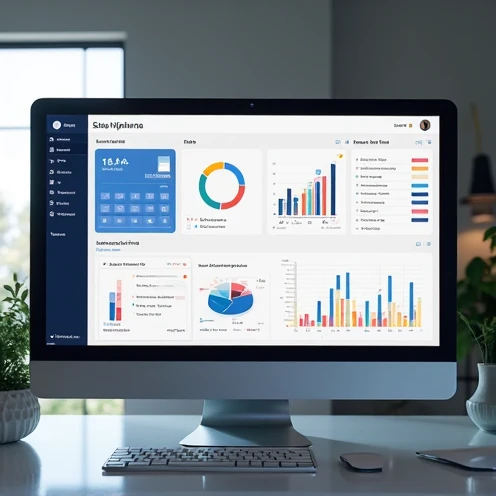The Heart of CRM
Lead Management Software plays a central role within CRM systems. It is designed to capture, track, and nurture potential customers until they are ready to make a purchase. By automating lead distribution and follow-ups, this software ensures no opportunity is lost.
Iklan Google AdSense
Unlike generic databases, Lead Management Software helps businesses qualify leads efficiently. Sales teams can focus on prospects who are most likely to convert, saving time and resources. The software also integrates with marketing campaigns, making the sales funnel more effective and measurable.
How Lead Management Software Works
The process begins by collecting leads from various channels—such as websites, emails, or social media. Once gathered, the system categorizes these leads based on predefined criteria. Sales representatives then receive notifications and can take immediate action.
Iklan Google AdSense
This streamlined process allows businesses to avoid delays, maintain communication consistency, and build stronger relationships. As a result, companies experience higher conversion rates and improved return on investment.
Understanding the Essence of Lead Management Software
Customer Relationship Management (CRM) is more than just a tool—it’s a strategic approach that helps businesses build stronger connections with customers. At its core, CRM enables companies to track, manage, and nurture customer interactions in a structured way. By using CRM, businesses can centralize data, improve communication, and create personalized experiences for customers.
Transitioning from traditional customer management methods to CRM transforms how organizations operate. Instead of scattered spreadsheets and emails, businesses gain a comprehensive system that simplifies workflows. This is why CRM continues to be a must-have solution in the digital era, where customer expectations evolve rapidly.
Why CRM Matters in Modern Business
In today’s competitive market, customers expect timely responses, personalized offers, and seamless service. CRM ensures companies meet these demands efficiently. With real-time data, organizations can anticipate customer needs and deliver tailored solutions. This approach doesn’t just enhance sales; it also builds long-term loyalty.
When businesses implement CRM, they unlock opportunities to analyze customer behavior. This allows for improved targeting and effective decision-making. Ultimately, CRM provides the backbone for creating sustainable growth in any industry.
The Evolution of CRM Technology
CRM has undergone significant transformation over the years. Initially, it was limited to contact management systems. However, modern CRM solutions now include AI-driven insights, automation tools, and omnichannel support. These advancements have turned CRM into an intelligent hub for customer engagement.
Today, CRM platforms integrate seamlessly with other business applications such as ERP, email marketing, and customer support systems. This integration empowers organizations to create a 360-degree view of their customer journey. As technology advances, CRM will only become smarter and more predictive.
The Rise of Cloud-Based CRM
One of the most impactful innovations is cloud-based CRM. Businesses no longer need to invest heavily in infrastructure, as cloud platforms provide scalability and accessibility. With mobile compatibility, sales teams can update records and access data anytime, anywhere.
This flexibility has made CRM adoption easier for small and medium-sized businesses. It levels the playing field by providing them with tools previously available only to large corporations.
Key Benefits of Implementing CRM
The advantages of using CRM are extensive. First and foremost, it enhances customer satisfaction by enabling personalized service. Businesses can address customer queries faster and provide tailored solutions that meet individual needs.
Another major benefit is increased efficiency. By automating repetitive tasks, CRM frees up time for employees to focus on strategic activities. From lead management to analytics, the system minimizes errors and boosts productivity.
Lead Management Software: CRM and Revenue Growth
CRM directly contributes to revenue growth by improving sales conversion rates. With accurate lead scoring and timely follow-ups, businesses close deals faster. Additionally, CRM systems provide insights that help sales teams identify cross-selling and upselling opportunities.
Furthermore, CRM helps reduce customer churn. By continuously engaging with customers and providing value, businesses encourage long-term loyalty. This recurring revenue becomes a vital pillar for sustainable success.
Common Challenges in CRM Adoption
While CRM offers immense benefits, some businesses struggle with its adoption. One common challenge is resistance from employees who are used to traditional methods. Without proper training and change management, companies may fail to realize CRM’s full potential.
Another hurdle is data quality. If information is outdated or inaccurate, the CRM system becomes less effective. Therefore, businesses must establish clear processes for maintaining data accuracy and consistency.
Overcoming the Challenges
The best way to overcome these challenges is through proper planning and user involvement. Training sessions, workshops, and continuous support help employees adapt. Additionally, businesses should regularly audit their data to ensure quality.
By addressing these obstacles early, organizations can maximize their investment in CRM and Lead Management Software.
CRM Trends to Watch in the Future
The future of CRM looks promising, with emerging technologies driving innovation. Artificial Intelligence (AI) and Machine Learning (ML) are already revolutionizing lead scoring, customer segmentation, and predictive analytics.
Another trend is the integration of CRM with social media platforms. Businesses can now track customer interactions on channels like Facebook, Instagram, and LinkedIn, creating more personalized engagement strategies.
Lead Management Software: Voice and Conversational CRM
Voice assistants and chatbots are making CRM systems more interactive. Instead of typing, users can simply speak commands to update records or access customer insights. This hands-free approach saves time and enhances usability.
As technology evolves, businesses should stay updated with these trends to maintain a competitive edge.
Best Practices for Using Lead Management Software
To maximize results, businesses must implement best practices when using Lead Management Software. First, they should define clear lead qualification criteria. This ensures sales teams focus on high-quality leads that have the greatest potential for conversion.
Second, businesses should automate follow-up processes. By setting reminders and email sequences, companies can maintain consistent communication with prospects. This prevents leads from going cold and increases chances of closing deals.
Leveraging Analytics for Better Results
Analytics play a crucial role in lead management. By tracking key performance indicators (KPIs), businesses can evaluate the effectiveness of their strategies. Insights such as conversion rates, response times, and customer behavior help refine future campaigns.
Regularly reviewing analytics also helps identify bottlenecks in the sales funnel. With this knowledge, organizations can make informed decisions that drive better outcomes.
CRM for Small and Medium Businesses
Many small and medium enterprises (SMEs) assume that CRM is only for large corporations. However, this is a misconception. Affordable cloud-based CRM solutions make it possible for SMEs to enjoy the same benefits as big companies.
For SMEs, CRM offers the ability to manage limited resources more effectively. By streamlining workflows and automating processes, small businesses can achieve growth without significant overhead costs.
Lead Management Software: Tailored Solutions for SMEs
The key for SMEs is to choose CRM solutions that match their specific needs. Scalable systems allow them to start small and expand as they grow. This flexibility ensures that CRM remains a valuable tool throughout their business journey.
With the right approach, SMEs can compete effectively in markets dominated by larger players.
How to Choose the Right CRM for Your Business
Selecting the right CRM requires careful consideration. Businesses should begin by analyzing their goals and identifying key challenges. Once they have clarity, they can evaluate CRM solutions that align with their objectives.
Important factors to consider include ease of use, integration capabilities, and scalability. A user-friendly interface ensures employees adopt the system quickly, while integrations create a unified business ecosystem.
Comparing CRM Vendors
It’s also essential to compare vendors based on pricing, customer support, and customization options. Reading reviews and requesting demos can provide valuable insights before making a decision.
By choosing wisely, businesses ensure their CRM investment delivers maximum value.
Building Stronger Customer Relationships
CRM is no longer optional—it is a necessity in today’s digital-first world. By implementing a robust system, businesses can streamline operations, boost sales, and deliver exceptional customer experiences.
Lead Management Software, as the heart of CRM, ensures that no opportunity goes unnoticed. With its ability to track, nurture, and convert leads, it plays a pivotal role in driving business success.
Companies that embrace CRM are better equipped to face the challenges of tomorrow while building lasting relationships with their customers.
Iklan Bersponsor Google






